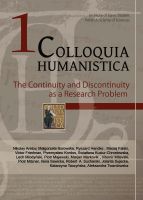The Continuity and Discontinuity. The Question of Territorialism and Double Identity from the Perspective of 20th Century Macedonia
The Continuity and Discontinuity. The Question of Territorialism and Double Identity from the Perspective of 20th Century Macedonia
Author(s): Jolanta SujeckaSubject(s): Cultural Essay, Political Essay, Societal Essay
Published by: Instytut Slawistyki Polskiej Akademii Nauk
Keywords: Macedonia; Identity; 20th century
Summary/Abstract: The issue of territorialism has spurred considerable multidisciplinary literature (B. Szacka, 1987; A. Kłoskowska, 1993; 1997; A. D. Smith, 1999). Its connection to the question of double identity, as reflected in the title of this paper, is not accidental and therefore, I imagine, requires an explanation (M. Melchior, 1990; 2004). Is not my ambition here to construct sweeping generalizations, the connection between the two issues in the title was dictated rather by my desire to share the knowledge about a corner of Balkan Europe where territorialism and double identity, albeit not yet verbalised as a coherent concept, have long determined, it seems, the way of perceiving one’s place in the world. Included implicitly in a number of statements published in the late 19th and throughout the 20th century by representatives of the Macedonian diaspora (Macedonia being the focus of my analysis), the two attitudes towards others, that is towards both the Balkans and the more distant Europe, constituted an integral part of the identity of (certain) Macedonian elites. (I use the term ‘Macedonian elites’ in its territorial sense to denote the intelligentsia from the territory of Macedonia in the late 19th and the first half of the 20th century.) Coexistence of these two attitudes, i.e. territorialism and double identity, was dependent on the state of the ethnic consciousness of a given group inhabiting Macedonia. It has occurred differently among the Jews from that area than among the Slavs. Among the latter it accompanied emerging ethnic self-identification. The 20th century, and especially its first half, determined their national choices. My presentation is an attempt to decipher the complicated axiological network conditioning the semantics of the term ‘a Macedonian’ in the 20th century from the point of view of Slavs living in the territory of Macedonia.
Journal: Colloquia Humanistica
- Issue Year: 2012
- Issue No: 1
- Page Range: 33-44
- Page Count: 12
- Language: Corsican

